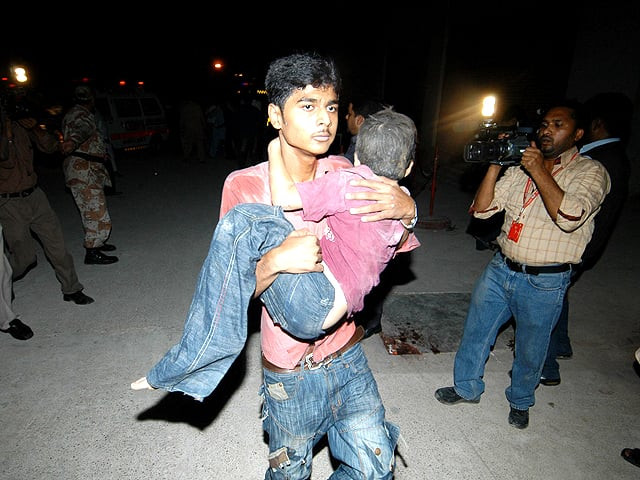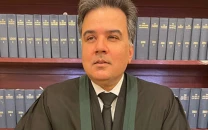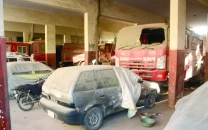Karachi: A victim of chaotic turf wars
Body count at Karachi hospital morgue is between 30-40 per week, says a morgue worker.

"There are 30 to 40 bodies some weeks," said morgue worker Miraj Mohsin. "When just one member of a party is killed, I know the other will respond and there could be many more deaths."
He held up a tag attached to a victim of Karachi's notorious targeted killings, often blamed on workers from rival political parties. The man's remains provided clues to his final moments before being shot in the back of the head -- the padlocked chain still binding his hands, the bruises on his spine suggesting torture.
In some ways, Karachi raises more troubling questions over Pakistan's stability than the northwest border regions seen as a global hub for militants, which the West worries about so much.
Samina Ahmed, Pakistan director at International Crisis Group, said political tensions are the biggest danger to Karachi at the moment, especially if the provincial coalition comes under too much strain that leads to more violence.
"Karachi is the financial hub of Pakistan. If Karachi goes down the rest of the country does as well," she said.
While army offensives are capable of disrupting Pakistan's Taliban insurgents -- who are linked to al Qaeda -- containing destructive forces in Pakistan's biggest city seems impossible. Criminal gangs, the mafia, extortionists, drug lords, weapons dealers and land grabbers ruthlessly guard their turf and in some cases are allegedly linked to political parties.
Karachi, home to 18 million people, looks like many other congested big cities. But those criminals make big headlines. An outgunned and underfunded police force of just 33,000 is in no position to take them on.
Karachi has a long history of ethnic, religious and sectarian violence. Hundreds of targeted killings this year have raised concerns that violence would escalate and create new crises for the US-backed Islamabad government, however.
It contributes 68 percent to the government's total revenue and 25 percent of GDP, according to officials. Most foreign companies have their headquarters here.
Trouble often means disruptions to industrial output and less chance of luring overseas investors, a task that has taken on greater urgency since summer floods hammered the economy.
Karachi has been relatively spared the large-scale militant attacks that hit other parts of the country. But they do occur -- a reminder that a growing nexus of militants group have found safe havens in the city.
In a brazen attack last week, a suspected Pakistan Taliban suicide car bombing demolished a crime investigation department compound where senior militants were interrogated. At least 18 people were killed and 100 wounded.
Focus on survival
Critics say politicians lack the will to stabilise Karachi, home to Pakistan's main port, stock exchange and central bank and the main gateway for Western military supplies bound for neighbouring land-locked Afghanistan.
The dominant Muttahida Qaumi Movement (MQM) and its rival, the ethnic Pashtun-based Awami National Party (ANP), say some of their workers carry out targeted killings, but without their blessings, and accuse each other of starting them.
The MQM is the dominant political force and is an influential partner in the federal government. It represents the Mohajirs, descendents of Urdu-speakers who migrated from India after the creation of Pakistan in 1947.
Better services, job creation and easing poverty are not top priorities while the parties fight it out. Provincial and federal politicians may have failed Karachi, but some Pakistanis still believe in a better future for the scarred metropolis.
Umar Ghaffour gave up his place in the corporate world abroad and returned to Pakistan in 2001. He now heads a chain of free Karachi-based eye care clinics funded by charities.
"The government may not be able to help. But I am optimistic. I believe in the Pakistani people," he said. "I was born in 1944. After partition my father told me we can dream about a future for Pakistan. We are still vividly dreaming."
In the dangerous world of Karachi politics, the focus is on survival. The murder of an MQM lawmaker in August triggered violence which killed 100 people in a week.
At MQM headquarters, guards run mirrors under vehicles to search for bombs when visitors arrive.
Provincial minister Faisal Ali Subzwari said he and four other MQM officials are on a hit list. It's too risky to visit his own constituency, he says.
Across town at a guarded compound, senior ANP official Shahi Syed says he would welcome the army on the streets. The heavyset man sat beneath a poster of ANP leaders past and present bearing the message "Peace on Earth".
"We will be happy if the military comes to Karachi. I think the army should, across the board, take control of the arms mafia, the land mafias, the drug mafia," he said, predicting 5,000 troops could clean up the city in about four months.
His explanation of future challenges was disrupted by a knock on the door. It was bad news -- he was told another ANP member had just been killed in a targeted shooting. The victim, Abdul Ghani, was shot dead and left beside a fish stall at a market, his brother said. "No place is safe. Wherever you sit you can be killed," said one of the mourners gathered at his home. "The best thing to do is to love death. So you can embrace it when it comes."



















COMMENTS
Comments are moderated and generally will be posted if they are on-topic and not abusive.
For more information, please see our Comments FAQ